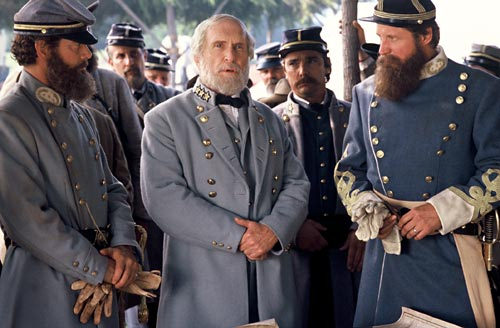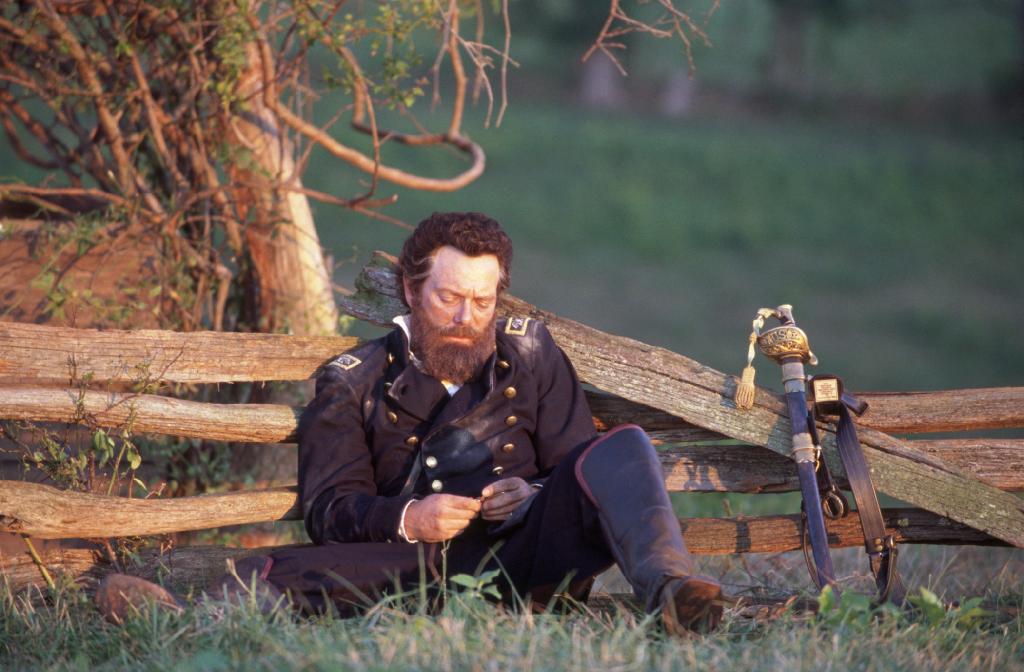
Woo boy. I’d be remiss to you my readers if I didn’t issue the following warning – do NOT go see Gods and Generals. (For some, this warning came too late – my parents went to see it this afternoon before I could convey the full gravity of its badness.) I go to the movies quite a bit, and this four-hour monstrosity may just be the worst film I ever spent money on. (My ex-wife and I walked out of A Night at the Roxbury, but that was a special case – the tickets were free. And, though I’ve mentioned my contempt for Magnolia a few times here, this was worse.) Sigh. This film was so bad I have to take it in stages…
Historical Context, Part I: Or lack thereof. Gods and Generals has a lot of faults but this has to be the most grievous. I can’t believe it’s the twenty-first century and they’re still making major studio movies about the Civil War like this. You have to get three hours or so into this film (and trust me – a lot of the people in the theater never made it) before you hear anything suggesting that slavery might have something to do with this irreconcilable conflict. Until then, it’s basically all told from the Confederate point of view, with several variations of “No, sirrah, we will not let these vahl, dastahdly Yankees take from us our country” offered up every ten minutes.
Now a film from Johnny Reb’s POV might not necessarily have been the atrocity this film turned out to be if some outside context was added to offset the Confederate perspective. But you don’t get it here. Not only is Stonewall Jackson (the main character) portrayed as a godfearing man who tells his trusty, faithful black cook (more on this soon) that he hopes slavery will end someday, but you have various other Southerners proclaiming that slavery will soon die a natural death, as if the country had split in two only because a bullying North wanted to hasten the end of a dying institution. Obviously, this is not so. Eleven states did not secede from the Union because they thought slavery should die of its own accord. They seceded because slavery was thriving in the Cotton Kingdom as both an economic system and a means of racial control. As Alexander Stephens, Vice-President of the Confederacy, noted in March of 1861 (before the war broke out), “Our new government [the C.S.A.] is founded upon exactly the opposite idea; its foundations are laid, its corner- stone rests, upon the great truth that the negro is not equal to the white man; that slavery — subordination to the superior race — is his natural and normal condition. This, our new government, is the first, in the history of the world, based upon this great physical, philosophical, and moral truth.”
Which brings us to race in Gods and Generals. Simply put, this film is shocking in its unnuanced depiction of African-Americans in the South – it’s amazing to me that this film ever got made in its present form. For one, the South seems almost universally white in almost all of the long-angle crowd shots (To be fair, this is Virginia, not South Carolina, and the ratio of blacks to whites would be considerably less than in the Lower South. But not this low.) Then you have the two African-American speaking parts – one a cook, the other a maid, both presumably slaves although I don’t remember it being mentioned. Both characters stick by their Southern masters through-and-through, congratulating them for their military successes and, in the latter case, defending her masters’ house from the rampaging Yankee hordes. You never get the sense that these or any other “loyal servants” might be hoping that the North wins the war, or that it was slave defection en masse that helped to bring an end to the Confederate war effort. As one reviewer noted, the portrayal of black Americans in this film makes Gone with the Wind seem like Do the Right Thing. To sum up, this version of events is SHAMEFUL.
Historical Context, Part II: Even putting these issues of ideological and racial context aside (and let me be clear – I for one don’t think you really can), Gods and Generals is a failure even on its own historical terms. What with the attention devoted in this film to three major battles – First Manassas, Fredericksburg, and Chancellorsville, it’s clear the movie is attempting to be a military-history-specific entrant in the standard, Ken Burns interpretation of the Civil War: Brother against Brother, Honor and Loyalty on both sides, blah blah blah. As a big fan of Bruce Catton’s military histories, this might have been enough for me if done well. But, for all the attention paid to brigade movements at certain engagements, or the smashing of Hooker’s flank at Chancellorsville, the macro-military history in this film is completely off. The movie jumps from the Union rout at the first Battle of Bull Run (Manassas) to Ambrose Burnside’s grievous screw-up at Fredericksburg. Which means that, even leaving aside the Western theater, the entire Peninsula campaign, the Battle of Seven Days, and most notably Antietam are NOT EVEN MENTIONED. It’s as if General George McClellan had never led the Union Army. I understand that you can only fit in so much in a four hour film (more on this soon), but at least make mention of the fact that a year and much war has taken place between two of the major setpieces. Why even bother with all the often seemingly-random descriptive subtitles of various brigades (more on these soon too) if you’re not going to bother mentioning the big picture? Even with regard to military history, this film takes place in a vacuum. In one of the few scenes on the Union side, the brothers Chamberlain mull over Lincoln’s Emancipation Proclamation. Fair enough, but never once does anybody say something along the lines of, “My goodness, we are kicking serious ass in the Western theater.” One would get the sense that Lee vs. the Army of the Potomac is the only game going, when it is in fact only the major piece in a much larger military story.
Gods and Generals as a Film: Even and despite all these glaring historical inaccuracies, the film still could have succeeded as a film. Take Gangs of New York, for example, which has all kinds of historical problems but still ended up being a reasonably entertaining film. But this film is just tedious and boring. I don’t really have any problems with the length in the abstract. A movie that will do justice to the first two years of the Civil War would need to be something like four hours long. It’s the choices made. On one hand, Abraham Lincoln is not in this picture(!) On the other, we get ten minutes of Confederate soldiers singing Christmas carols, twenty minutes of Stonewall Jackson conducting a near-inappropriate relationship with a five-year-old girl, TWENTY-FIVE minutes of Stonewall Jackson on his death bed (I can’t have been the only person thinking it might be nigh time to bring out a pillow and facilitate Stonewall’s passage to the Lord.) Even the battlefield scenes, which you could argue is the one thing that this film is decently good at, are too long. At Fredericksburg, the Union and Confederate Irish brigades go at it tearfully for so long that even I – an Irish-American interested in the Civil War – thought it was ponderous and overwrought. Deadly dull stuff here.
And then there’s the acting. First off, Robert Duvall as General Lee, while barely in the film, is quite good. Stephen Lang as Stonewall Jackson, given what he had to work with, is also decent. Jeff Daniels, C. Thomas Howell, and Matt Letscher – as Joshua Chamberlain, Tom Chamberlain, and Adelbert Ames respectively – all give convincing performances as fighting Maine men. Mira Sorvino was beautiful and erudite in her one ten minute appearance as Mrs. Chamberlain, even if she was inexplicably using a British accent straight out of a Merchant-Ivory film. And that’s about it. Otherwise, there are some seriously bad performances in this film, the worst possibly being Jeremy London of Mallrats as one of Stonewall’s staff. Some scenes, like the Virginia House of Burgesses moment at the start of the film, come off like third-rate Williamsburg. At other times, I felt like I was watching “The History of the Merton-Flemmer Building” in Being John Malkovich. Flat-out egregious, although to be fair this film relies on so many ridiculous stock-character tropes that some of the bad performances couldn’t be helped. I’ve already mentioned Stonewall’s loyal cook and the sickly five-year-old girl. Mention should also be made of the grizzled Irish veteran, who strangely decides to pal around with the officers all the time. Bad writing, bad acting, the whole nine – this film fails on every level, up to and including…
The Special Effects: Ok, I know one doesn’t go to a Civil War film for the FX. That being said, this film has absolutely, positively the worst special effects I’ve ever seen in a film costing more than $2 million. I don’t know who they paid to make them and for how much, but I could have done it for half and delivered a better product using Adobe Photoshop. Even at the very beginning of the film, before I realized what a stinker I was in for, I was wondering, “Hmm, that’s funny. Why do Washington and Harper’s Ferry look like Naboo?” Every establishing matte shot in the movie looks like it was colored in by a over-caffeinated eight-year-old. One scene early on has a computerized rippling flag which may be the single worst special effect in CGI history. And then there’s the far-angle battlefield scenes, which are honestly so bad I can’t believe they used them so much. Not only did the Union lines always look drawn in, but I swear the same three wounded soldiers keep straggling back. In every shot. Just laughable. Finally, the movie relies quite often on subtitles to explain who and what we’re looking at (and at least three times they described individuals or brigades that had no bearing on the rest of the story – probably a mistake on the editing floor, I guess.) Whomever made these ubiquitous subtitles, I don’t think they realized that their computer has more than one font. What they ended up using was this ugly typewriter font that looked not only awfully cheap and tagged-on but anachronistic. I’m telling you, pay me half of whatever you paid for this garbage and I could have given you some nice subtitles in Bookman Old Style or something. As it is, the fx and subtitles only further detract from a terrible film.
Wasn’t there anything good? Well, not really, no. I did appreciate WETA and MASSIVE’s fx work and PJ’s battlefield directing on LOTR: The Two Towers so much more after seeing Gods and Generals. And I guess there might be a few scenes throughout where you get the sense that this could just maybe have been a better movie. Jeff Daniels’ “Hail Caesar” pre-fight speech was well-delivered, and the standard behind-the-lines North-South goods exchange, when a Union soldier offers to trade General Burnside for a lame horse, was probably the only moment when I was laughing with the movie and not at it. But that’s about it.No, this movie is terrible. I gave it 1 star for some of the (non-fx) battlefield work, and half a star so nobody would misread (1/10) as (10/10). To sum up, Gods and Generals is awful. You have been warned.

